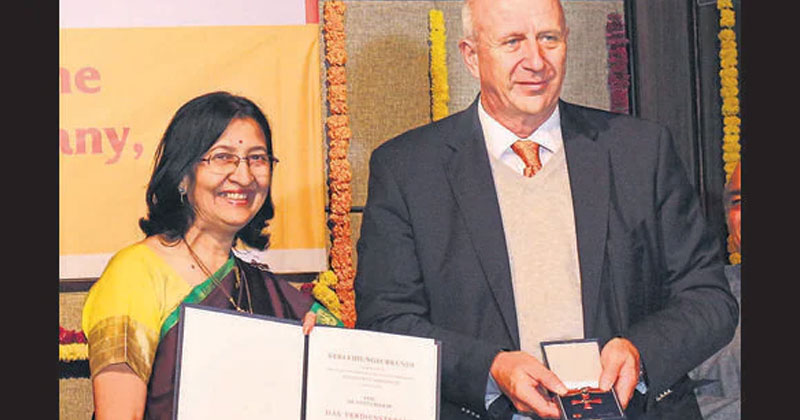“German is a difficult-to-use language,” especially on a daily basis. Moreover, “German is way more difficult than speaking French in everyday life.” Having said that, some pronunciations in German are far too difficult to understand as well, all of which makes the language way tougher than what most would know.
The above may seem like the gospel truth about the language or well established facts that find little or no relevance in the eyes of those who master it. Or for the matter, those among us, who have cared to look at a widely spoken language rather differently. But tell Pune’s Professor Savita Kelkar any of the above presumptions about the said language and what may meet you would be a casual smile- nothing more.
For someone who recently won Germany’s Order of Merit, Savita Kelkar is neither too ecstatic nor too amused about what the wider public of the world has to say about the German language. The recent winner of the revered Order of Merit, rightly speaking, thinks of the German language in her own way.
Ever understanding of the fact that a language that, regardless of what one speaks of it or considers it, is one of the widely spoken languages in the world and not just that, but the second-most frequently used scientific languages has more depth to it than many would realize.
So in some ways, truth be known, Savita Kelkar winning the Order of Merit is about as significant a move as the world adopting another air purifier in times engulfed in massive pollution. Moreover, this widely respected Punekar’s winning of the Order of Merit also places India on a revered pedestal of those in the world who have mastered the great language connected to the heart and soul and the very bearings of Deutschland.
In her view, Savita Kelkar understands the massive- albeit often underappreciated- utility of the German language as she states in no uncertain terms that the language’s contribution to shaping up of technology, literature, philosophy, theology, science and commerce is unparalleled and truly, one of a kind.
Interestingly, Savita Kelkar also happens to be the first woman life member of the Deccan Education Society and she was recently decorated with the Order of Merit in Germany itself in the presence of the consul general of the Federal Republic of Germany, Mr. Jurgen Morhard.
The following is what the Hindustan Times had to say about the professor’s achievement:
“I am honoured to be bestowed this merit and never expected this. I have always had a passion for the language and culture, and am happy to be a bridge between the two countries,” said Ms Kelkar.
A recipient of several ‘best teacher’ awards including ‘corporation’s best teacher’, ‘Shri Saraswati Puruskar’ and the ‘state-level best teacher’, Kelkar, said, “German lessons in India began for the first time in Pune and are connected to the history of Bombay university as all colleges in Pune were affiliated to Bombay university till 1949. When the presidency of Bombay university proposed modernising university courses in 1908, the senate established a committee. Sir Raghunath Paranjpe, a member of this committee, proposed studying German with a degree (B.A.) on April 21, 1911 and the committee included German as one of the minor subjects.


